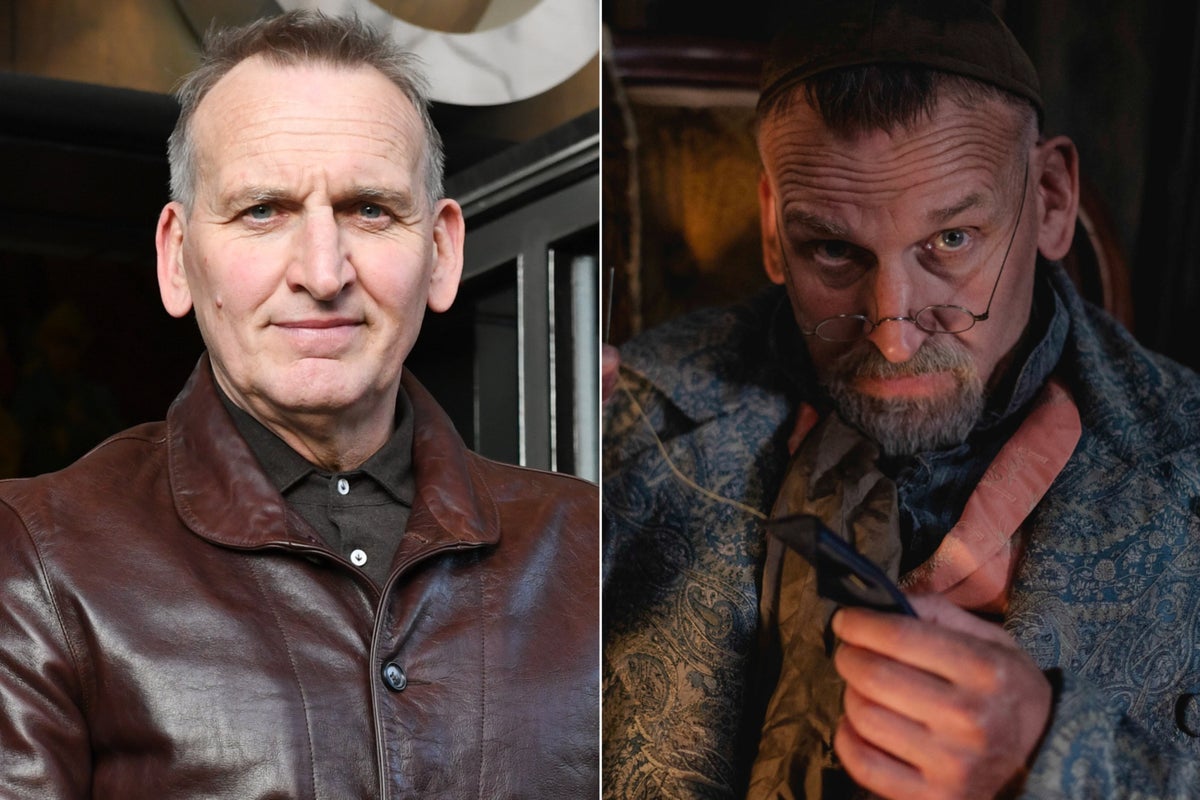
Christopher Eccleston has waded into the debate about who can play Jewish characters after defending his performance as Fagin in an Oliver Twist spin-off series.
The British actor, known as the first actor to star in Russell T Davies’s rebooted Doctor Who in 2005, played the villainous pickpocket group leader in Dodger, a prequel series made for the BBC’s children’s channel CBBC.
In Dickens’s original text, Fagin is repeatedly referred to as “the Jew”, with many academics arguing that the character is antisemitically painted as the “archetypal Jewish villain”.
In a new interview, Eccleston toldThe Guardian that when his casting was announced, some had questioned whether a non-Jewish actor like him should play the role.
‘Doctor Who’ star plays Dickens’s villain in CBBC spin-off show— (Getty/BBC)
The 59-year-old remembered a Jewish actor “noting they didn’t object to non-Jewish people playing Jewish roles, [they would] just like it to be spoken about. Which I completely agree with. But if I could only play people like me, what’s the point? What Salman Rushdie recently said – that it’s the death of art.”
In October, as he received a prize in Germany for literary work, author Rushdie spoke about the importance of freedom of expression in art.
“If we’re in a world where only women can write about women and only people from India can write about people from India and only straight people can write about straight people… then that’s the death of the art,” he said.
In recent years, there has been much debate around Jewish roles being played by actors who are not Jewish, with the phenomenon colloquially known as “jewface” (a play on Blackface). In August, comedian David Baddiel questioned the casting of Cillian Murphy as the titular theoretical physicist Robert J Oppenheimer in Oppenheimer.
“Authenticity casting I think of as an a priori thing that exists,” Baddiel, author of the book Jews Don’t Count, said. “Whatever the rights and wrongs of it, I can promise you that in this business – and I am in this business still – casting directors are now frightened to cast except in line with the minority they are casting. But they are not so worried about Jews.”
While Eccleston was critical of restrictions on casting, the actor said he was in favour of more “positive discrimination” to ensure actors from underrepresented groups could get their foot in the door to play themselves on screen.
Eccleston as Fagin in ‘Dodger'— (BBC/NBCUniversal International Studios)
Asked whether he thought only working class talent should portray working class parts, Eccleston said: “No, but I think there should be a bit of positive discrimination. It’s far more acceptable for them to come down than for us to go up. But it’s the death of things, isn’t it?”
Born in a working class family in Salford, Eccleston’s entry into the acting world was facilitated by a grant to study at drama school and a lack of student debt. The Leftovers star that he found it “devastating” to think that future generations of working class talent wouldn’t have the same opportunities as him.
In April, the actor said that he felt it would be “impossible” for him to become an actor if he was starting out today, due to not having attended a private school.
Speaking about the closure of Oldham’s historic Coliseum theatre and its impact on the community, he said: “If you grow up in the North West, you don’t feel the culture and the arts belong to you. You don’t believe, if you come from a council estate, [that] you can be an actor, a poet or a painter.”
Eccleston said that he “wouldn’t be an actor” if it wasn’t for regional theatres like the Coliseum, stating: And they’re disappearing. So what happens to this generation’s Chris Ecclestons or Maxine Peakes, or whoever you want to name?
“There’s no more actors like me coming through – it’s impossible. Now, you’ve just got to go to public school, haven’t you? You’ve got to go to Oxbridge, otherwise you can’t act.”







